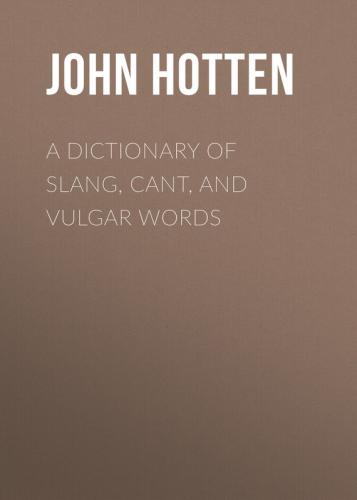A DICTIONARY OF MODERN SLANG, CANT, & VULGAR WORDS;
MANY WITH THEIR ETYMOLOGIES TRACED
A 1, first rate, the very best; “she’s a prime girl she is; she is A 1.“ —Sam Slick. The highest classification of ships at Lloyd’s; common term in the United States, also at Liverpool and other English seaports. Another, even more intensitive form, is “first-class, letter A, No. 1.”
ABOUT RIGHT, “to do the thing ABOUT RIGHT,” i. e., to do it properly, soundly, correctly; “he guv it ’im ABOUT RIGHT,” i. e., he beat him severely.
ABRAM-SHAM, or SHAM-ABRAHAM, to feign sickness or distress. From ABRAM MAN, the ancient cant term for a begging impostor, or one who pretended to have been mad. —Burton’s Anatomy of Melancholy, part i., sec. 2, vol. i., p. 360. When Abraham Newland was Cashier of the Bank of England, and signed their notes, it was sung: —
“I have heard people say
That SHAM ABRAHAM you may,
But you mustn’t SHAM ABRAHAM Newland.”
ABSQUATULATE, to run away, or abscond; a hybrid American expression, from the Latin ab, and “squat,” to settle.
ADAM’S ALE, water. —English. The Scotch term is ADAM’S WINE.
AGGERAWATORS (corruption of Aggravators), the greasy locks of hair in vogue among costermongers and other street folk, worn twisted from the temple back towards the ear. They are also, from a supposed resemblance in form, termed NEWGATE KNOCKERS, which see. —Sala’s Gas-light, &c.
ALDERMAN, a half-crown – possibly from its rotundity.
ALDERMAN, a turkey.
ALDERMAN IN CHAINS, a turkey hung with sausages.
ALL OF A HUGH! all on one side, or with a thump; the word HUGH being pronounced with a grunt. —Suffolk.
ALL MY EYE, answer of astonishment to an improbable story; ALL MY EYE AND BETTY MARTIN, a vulgar phrase with similar meaning, said to be the commencement of a Popish prayer to St. Martin, “Oh mihi, beate Martine,” and fallen into discredit at the Reformation.
ALL-OVERISH, neither sick nor well, the premonitory symptoms of illness.
Конец ознакомительного фрагмента.
Текст предоставлен ООО «ЛитРес».
Прочитайте эту книгу целиком, купив полную легальную версию на ЛитРес.
Безопасно оплатить книгу можно банковской картой Visa, MasterCard, Maestro, со счета мобильного телефона, с платежного терминала, в салоне МТС или Связной, через PayPal, WebMoney, Яндекс.Деньги, QIWI Кошелек, бонусными картами или другим удобным Вам способом.
